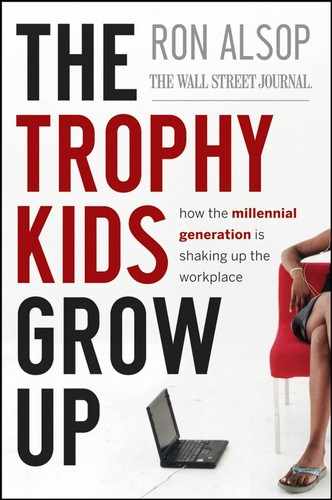6.2. BOSSES OR BABYSITTERS?
Many millennials, in fact, aren't ready to grapple with complex business problems alone. Once they move into the workplace, they still want lots of hand holding. They flounder without precise guidelines but thrive in structured situations that provide clearly defined rules and the order that they crave. They like a straightforward road map and timeline of what their job responsibilities are and how they will pay off in terms of career advancement. That way, they figure, there will be no mistaking what they're expected to accomplish. In short, they want a clearly scripted work life. Of course, that's impossible in today's volatile business environment, but try telling that to a millennial.
So what's a manager to do with these checklist kids? At times, bosses may feel like overworked babysitters. After all, who has time to keep making lists and shepherding millennials so that they stay on task? But managers had better get used to it. They will have to spend many hours explaining their expectations as clearly as possible. Those expectations can be quite high; they just can't be vague. Managers will need to give step-by-step directions for handling everything from projects to voice-mail messages to client meetings. The bottom line is that you can't assume anything with millennials. It may seem obvious that employees should show up on time, limit lunchtime to an hour, and turn off cell phones during meetings. But those basics aren't necessarily apparent to many millennials. Their ignorance of workplace norms is sometimes truly astounding.
Used to relying on parents and teachers to keep them on track to meet deadlines, some millennials now expect the same close oversight from managers. They need someone to tell them what to do next and to keep reminding them when it's due. Gail McDaniel, a corporate consultant and career coach for college students, spoke to managers at a health care company who were frustrated by some of their millennial employees. It seems that one young man missed an important deadline, and when his manager asked him to explain, he said, "Oh, you forgot to remind me."
Parents and teachers aren't doing millennials any favors by constantly adapting to their needs, McDaniel says. "Going into the workplace, they have an expectation that companies will adapt for them, too. These kids become accustomed to specific tasks being laid out for them and don't want to take personal responsibility." Her solution: managers must put more emphasis on explaining in detail how a millennial's work affects the big picture at the company and what the consequences will be if a deadline is missed.
Some management experts advise companies to start out by giving their new millennial hires short-term deadlines. As they improve their time management skills, perhaps through corporate training programs, they should be able to handle longer-range projects without so much direction and supervision. Some managers also find it useful to tell millennials to at least brainstorm some possible solutions before running to them for advice about every little complication.
